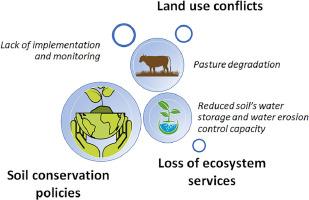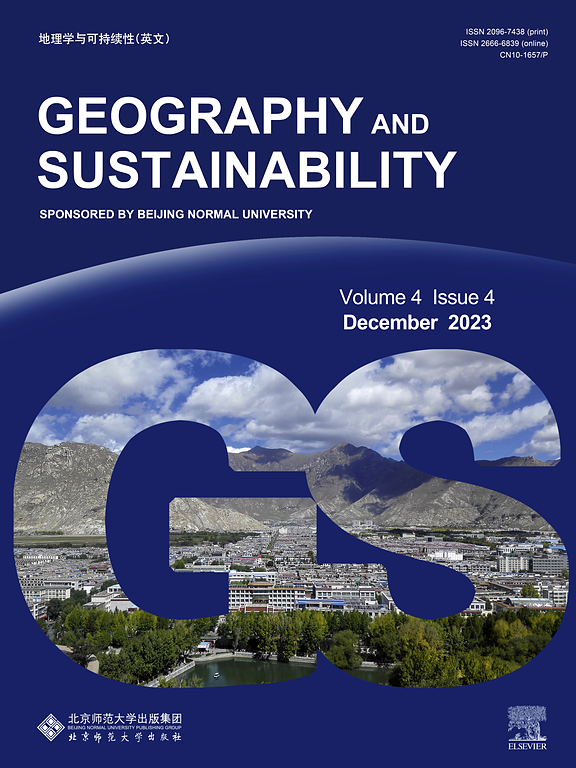Ecosystem services potential and soil conservation policies with emphasis on degraded pastures in Brazil
IF 8
1区 环境科学与生态学
Q1 GEOGRAPHY, PHYSICAL
引用次数: 0
Abstract
Different global agendas have discussed the role of soils in mitigating and reducing global problems related to climate change, food security, biodiversity and erosion, among others. With this in mind, the aim was to draw up an overview of the main soil agendas in Europe and Brazil, analysing their impact on the establishment of legal frameworks for soil use and conservation. In Brazil, pastures are seen as an important alternative for converting degraded areas into ecosystem services. To this end, a literature review was carried out using databases on the Scopus, Web of Science, Science Direct and Scielo platforms, as well as consulting documents from the European Union Missions in Horizon Europe and Brazilian legislation on the subject. In a pilot river basin, the Potential for Conservation Use (PCU) method was applied, which is used in Brazil to assess the impacts of different uses on the natural capital of soils, serving as a metric to guide public soil conservation policies. It was concluded that, on the European scene, discussions on soils have taken place in an integrated and organised way, with actions to mobilise different players in society. In Brazil, even though there are important legal frameworks, actions are still restricted and disjointed, pointing to the need for progress in soil governance. In both scenarios, there is a need for scientifically validated metrics at regional scales that can contribute to a harmonised database capable of subsidising the development of efficient public policies to advance soil conservation at a global level.

生态系统服务潜力和土壤保护政策,重点是巴西的退化牧场
不同的全球议程都讨论了土壤在缓解和减少气候变化、粮食安全、生物多样性和侵蚀等全球问题方面的作用。有鉴于此,我们的目的是概述欧洲和巴西的主要土壤议程,分析它们对建立土壤利用和保护法律框架的影响。在巴西,牧场被视为将退化地区转化为生态系统服务的重要选择。为此,我们利用 Scopus、Web of Science、Science Direct 和 Scielo 平台上的数据库进行了文献综述,并查阅了欧洲联盟驻地平线欧洲代表团的文件和巴西的相关立法。在一个试点流域,采用了保护性利用潜力(PCU)方法,该方法在巴西被用于评估不同用途对土壤自然资本的影响,作为指导公共土壤保护政策的指标。最后得出的结论是,在欧洲,关于土壤的讨论是以综合和有组织的方式进行的,并采取了动员社会不同参与者的行动。在巴西,尽管有重要的法律框架,但行动仍然受到限制,而且相互脱节,这表明需要在土壤治理方面取得进展。在这两种情况下,都需要在区域范围内制定经过科学验证的衡量标准,从而有助于建立一个统一的数据库,为制定有效的公共政策提供支持,在全球范围内推进土壤保护。
本文章由计算机程序翻译,如有差异,请以英文原文为准。
求助全文
约1分钟内获得全文
求助全文
来源期刊

Geography and Sustainability
Social Sciences-Geography, Planning and Development
CiteScore
16.70
自引率
3.10%
发文量
32
审稿时长
41 days
期刊介绍:
Geography and Sustainability serves as a central hub for interdisciplinary research and education aimed at promoting sustainable development from an integrated geography perspective. By bridging natural and human sciences, the journal fosters broader analysis and innovative thinking on global and regional sustainability issues.
Geography and Sustainability welcomes original, high-quality research articles, review articles, short communications, technical comments, perspective articles and editorials on the following themes:
Geographical Processes: Interactions with and between water, soil, atmosphere and the biosphere and their spatio-temporal variations;
Human-Environmental Systems: Interactions between humans and the environment, resilience of socio-ecological systems and vulnerability;
Ecosystem Services and Human Wellbeing: Ecosystem structure, processes, services and their linkages with human wellbeing;
Sustainable Development: Theory, practice and critical challenges in sustainable development.
 求助内容:
求助内容: 应助结果提醒方式:
应助结果提醒方式:


